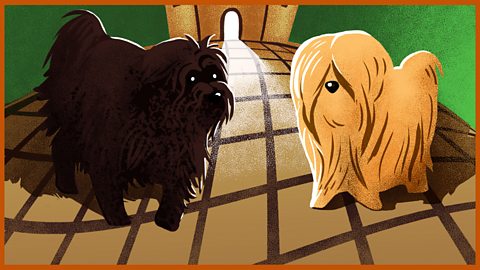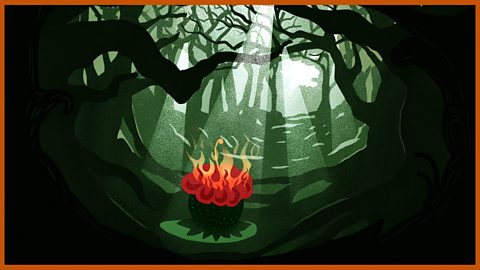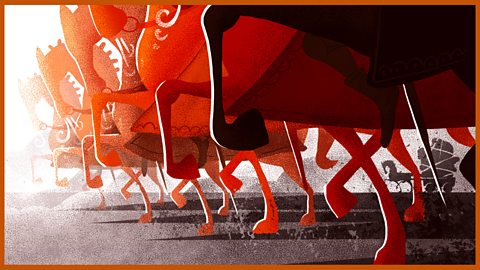Hamlet Lives Forever - a story inspired by Hamlet, written by Horatio Clare and read by Julian Rhind-Tutt.
Synopsis
Hamlet is Shakespeareâs most famous tragedy. In Hamlet Lives Forever by Horatio Clare, Shakespeare is telling the story of Hamlet to his son Hamnet, who died at the age of eleven. Shakespeare meets Hamnet in an orchard, representing paradise, and tells him the story of Hamlet in the manner of a bedtime story. There is a touching parallel in the re-telling between the paradise afterlife ofShakespeareâs son Hamnet and the âafterlifeâ of Shakespeareâs play Hamlet, which lives on forever as the most famous play in the English language.

Interview with writer Horatio Clare
Ìę
Ideas for use in the classroom
Philosophy for kids
Hamlet is a deeply philosophical play. Hamlet himself spends a great deal of time thinking about what he should do and whether he should avenge his father. His most famous speech - âTo be or not to be, that is the questionâŠâ - centres on the question of whether it is better to live or die. Hamlet even suggests that the only thing preventing us from ending our lives on Earth is the fear of the unknown afterlife, which might be more painful than our mortal life. This is pretty heavy stuff â but the re-telling opens up a number of accessible philosophical enquiries and thought provoking questions that children will love to explore. Here are some examples of questions that children could consider. Before considering these questions and to ensure a lively debate, tell children that there are no right or wrong answers in Philosophy.
Shakespeare tells his son Hamnet that the play of Hamlet will live forever because after Shakespeare is dead it will be acted on stages for years and years to come. He was right. Hamlet is the most famous play in the world, 400 years after Shakespeareâs death. It is kept alive every time it is performed.
Questions to think about:
What is a legacy? Children could look this word up in the dictionary or research it on the internet.
Can you think of any famous people who have left legacies?
Many years after your death, what will your legacy be?
How do you hope that you will leave an impact on the world?
(Children may talk about either improving the world in grand ways or by leaving behind their own children, grandchildren, family or friends who will keep them alive after they have died by remembering them. They may talk about their own grandparents or great grandparents who have died and left a similar legacy).In the re-telling, Shakespeare tells Hamnet that âDeath and Time are nothing compared to Love.â He keeps Hamnet alive by talking to him and remembering him after death.
Questions to think about:
Have you ever had a pet cat or dog that died?
Is your pet still âaliveâ when you think about it or share stories about it?
If people talk about you and share memories of you after you have died, does this mean that you are still âaliveâ in some way?Claudius does a terrible thing by killing his brother. Straight after the play that Hamlet stages, Claudius tries to pray to God to say that he is sorry for what he has done but he says, âMy words fly up, my thoughts remain below. Words without thoughts never to heaven go.â
Questions to think about:
Is Claudius really sorry or is he only sorry because he knows that Hamlet has discovered his crime?
Can you think of any examples of a time when you said sorry just because you were found out?
Does âsaying sorryâ always mean that you really are sorry?
Can Claudius be truly sorry for what he did when he still wears the dead kingâs crown and is married to the dead kingâs wife?He got those things by murdering his brother.
If you steal your best friendâs bike, can you tell your friend you are sorry about it but still keep the bike?Claudius is trying to pray to God for forgiveness but he canât send his words to heaven.Is there anyone else he could ask for forgiveness? Can he forgive himself?In the re-telling, Shakespeare says that we âcannot control the simplest things, like joy and grief, and love and death.âThis would be a good opportunity to look at a text like Michael Rosenâs Sad Book and discuss what grief and sadness look like.
Questions to consider:
How do you behave when you are sad?
Can you tell that someone is sad just by looking at them?
Why not?
Hamlet âpretendsâ to be mad so that he can investigate his fatherâs death. Have you ever pretended to be happy when you were sad, or to be sad when you were happy? Why? Why do our emotions make us act in particular ways? Does everyone act in the same way when they are sad, happy, angry or afraid?
English
Claudius is a truly evil character; one of the worst in Shakespeareâs canon! Children could write poetry about just how sly and sneaky he is. Look for the John Agard poem âDonât Call Alligator Long-Mouth Till You Cross The Riverâ, which provides a great template for writing about a nasty character (once you are out of his grips). Write poems called âDonât Call Claudius XXX Till You Get Out of Denmark!â (eg âDonât Call Claudius King KillerâŠFoul PoisonerâŠetc.)
In the re-telling, Shakespeare tells Hamnet that he likes âthinking about you, and the kind of man you might have been.â Ask children to think about the kind of man or woman they might be in the future. Create a âbucket-listâ of ten things you want to achieve in the future. Model this with the children first, encouraging them to think about themselves as âseeds which will grow to be great men and womenâ (as Shakespeare says to Hamnet in the re-telling).
Create a ârole on the wallâ for Hamlet and Claudius, detailing their qualities.
Hot seat Hamlet with questions such as:
- Were you really mad or did you just pretend to be?
- Did you believe the ghost when you first saw him?
- How did you feel when you heard that your girlfriend Ophelia had died?
- When did you know for sure that Claudius had killed your father?
- How did you feel about your mother marrying your uncle?
- Did you have any idea that the fencing match was a trap?
Children can generate their own further questions based on the re-telling. They could also hot seat Shakespeare himself about his relationship with his son Hamnet, based on the re-telling.
History
Research Shakespeareâs family tree. Hamnet Shakespeare was a twin with his sister Judith (who survived William Shakespeare). Tellthe children this before they begin their research and as an extra challenge, see whether they can find any references to twins inShakespeareâs plays. (Note: Twelfth Night is a play about shipwrecked boy/girl twins (just like Judith and Hamnet) called Viola and Sebastian, each of whom think the other has died in a shipwreck, but who are reunited at the end of the play. An early play, The Comedy of Errors, features two sets of identical master and servant twins, who are separated as babies (once again in a shipwreck!) and are reunited after much mistaken identity confusion!).
See Teachers' notes below for more ideas

Ìę
Ìę
More from this series
The Taming of the Kat Dog. audio
A Gareth P Jones story inspired by The Taming of the Shrew. Read by Verity-May Henry.

A Midsummer Camp's Dream. audio
Laura Dockrill retells the story of A Midsummer Night's Dream. Read by Shirley Henderson.

Henry V - A Soldierâs Tale. audio
A short story inspired by Henry V written by Geraldine McCaughrean. Read by David Gyasi.
